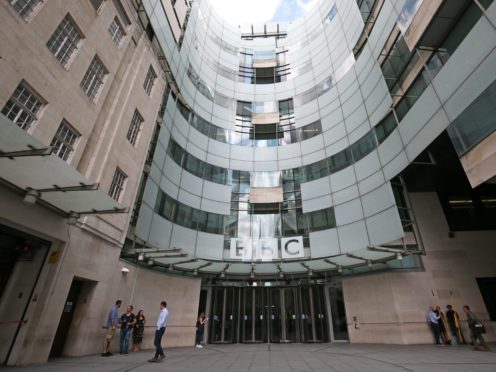Downing Street has said the BBC needs to explain why staffing costs are increasing despite the corporation saying it cannot afford to fund TV licences for the over-75s.
The broadcaster has revealed the pay packets of its talent for the first time since the decision over free TV licences for pensioners was announced, featuring Gary Lineker with £1.75 million at the top.
A number of the BBC’s stars, including Jo Whiley, Lauren Laverne and Fiona Bruce, have been handed pay rises over the past year.
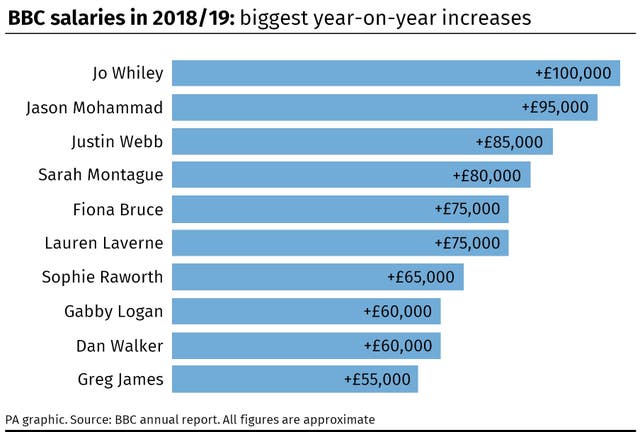
The Prime Minster’s official spokesman said: “As a public service broadcaster funded by the licence fee, the BBC has a responsibility to lead the way in promoting workplace equality.
“We welcome the progress made but the BBC themselves admit there is much more to do.
“At the same time the BBC needs to explain why they increased the on-air pay and total staffing costs while saying they can’t fund free TV licences for over-75s.
“As the PM has made clear, taxpayers expect the BBC to use its substantial licence fee income in an appropriate way to make sure it delivers for UK audiences, which includes showing restraint on salaries for senior staff.”
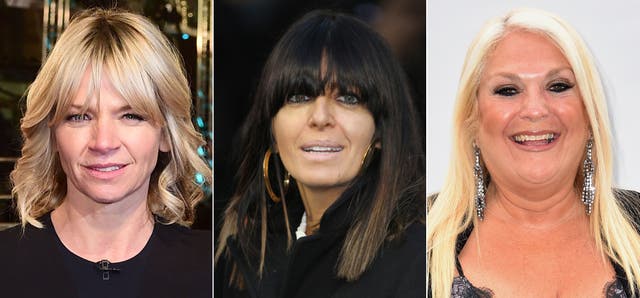
In response, a BBC spokeswoman said: “Staff numbers are up not least because the Government gave us more money to expand the World Service – and we can’t do that without extra people.
“Beyond that, we have also spent more on our programmes – which is good for audiences – but we’ve still managed to reduce the proportion of our content budget that we spend on talent. The average pay of those on the talent list is actually falling, and the cost of our top 10 highest earners is down by nearly 10% since last year.
“Above all, it’s well known that the BBC pays less than people can earn at commercial broadcasters. The National Audit Office report said this recently. And when we ask audiences, four out of five people tell us they want the biggest and best names on the BBC.”
The latest BBC annual report shows that the total amount paid to its top stars – those earning at least £150,000 – has gone up, from around £19 million in 2017/18 to around £21 million in 2018/19.
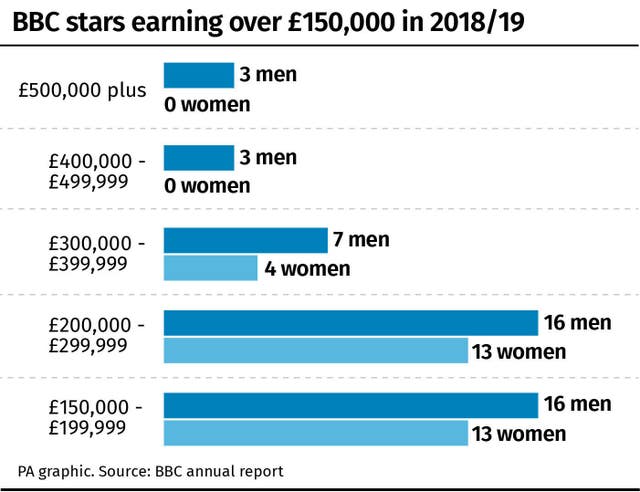
However, the average pay of the corporation’s biggest stars has fallen, down 6% from around £300,000 in 2017/18 to around £282,000 in 2018/19.
The proportion of the content budget spent on talent has also dropped, from 11% in 2017/18 to 10% in 2018/2019.
The BBC has said said that their overall talent bill, for all of the presenters and contributors across the whole of the BBC, has increased because they have invested £239 million more in content over the past year.
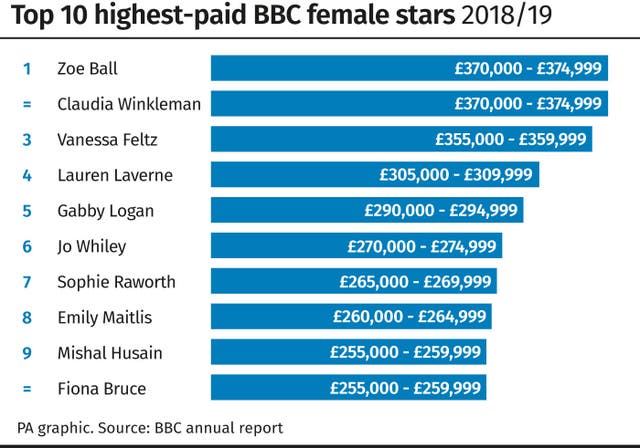
Radio 2 DJ Whiley’s salary is up around £100,000 on the previous year to around £270,000 – she previously presented the Drivetime show alongside Simon Mayo.
6 Music host Lauren Laverne – now presenting Desert Island Discs – is up by £75,000, while TV presenter and newsreader Bruce, who has taken over as Question Time host, has had a boost of around £75,000.
The BBC was first forced, by the Government, to reveal the salaries of dozens of its presenters in 2016, when the publication sparked a gender pay row.
The new figures show that many men at the broadcaster, whose recent TV hits have included Bodyguard, Killing Eve and Blue Planet II, have taken pay cuts.
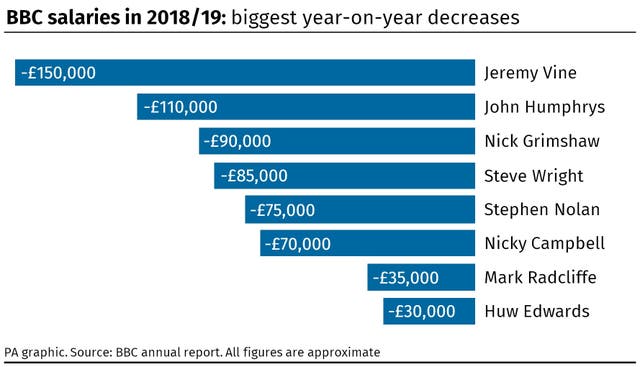
They include Radio 2 presenter Jeremy Vine (a drop of around £150,000 to around £290,000), Today host John Humphrys (a fall of £110,000 to around £290,000), and Radio 1 DJ Nick Grimshaw (by around £90,000 to £310,000).
But others have seen jumps in their salaries, this year’s annual report shows.
They have been revealed just weeks after the BBC announced it will scrap the universal free TV licence for over-75s.
Read our latest annual report here: https://t.co/DQL7zjSI3J
— BBC Press Office (@bbcpress) July 2, 2019
The TaxPayers’ Alliance, which opposes the BBC licence fee, criticised the increases.
Harry Fone, grassroots campaign manager for the Alliance, said: “After announcing that many pensioners will now be forced to pay the dreaded TV tax, you’d think the BBC would have shown more respect to taxpayers by cutting back on unnecessary spending.
“How can the BBC justify giving so many sky-high salaries – that most licence-fee payers can only dream of – when whacking up charges on older people?”
But BBC chairman Sir David Clementi dismissed the suggestion that the BBC could fund free TV licences for over-75s by cutting the pay of stars.
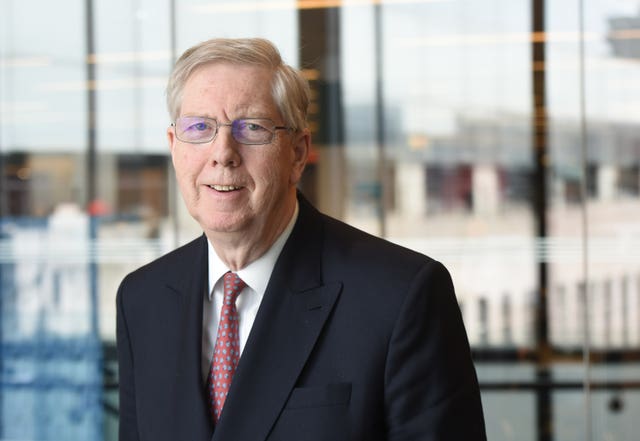
Many have urged the Government to commit to continuing the funding for the benefit, saying it is breaking a manifesto pledge by putting the responsibility on the BBC.
And Sir David said: “The sums don’t add up. It is clear in this report that even if we employed no stars paid more than £150,000… that would save around £20 million, a fraction of the £745 million a year and rising we would need if we extended the concession to all.”
The BBC has said that funding the universal scheme would mean the closure of BBC Two, BBC Four, the BBC News Channel, the BBC Scotland channel, Radio 5 Live, and several local radio stations.
BBC Breakfast host and sport presenter Dan Walker’s salary is up by around £60,000, while Today presenters Justin Webb and Nick Robinson have had rises of £85,000 and £40,000 respectively.
And they are topped by TV and radio presenter Jason Mohammad who has pocketed a £95,000 increase to around £355,000.
Radio 4 Today programme presenters Martha Kearney (by £45,000) and Mishal Husain (by £35,000) have also seen their salaries increase.
The inclusion of Zoe Ball, Vanessa Feltz and Claudia Winkleman mean that women are in the top 10 for the first time, compared to last year’s all-male list.
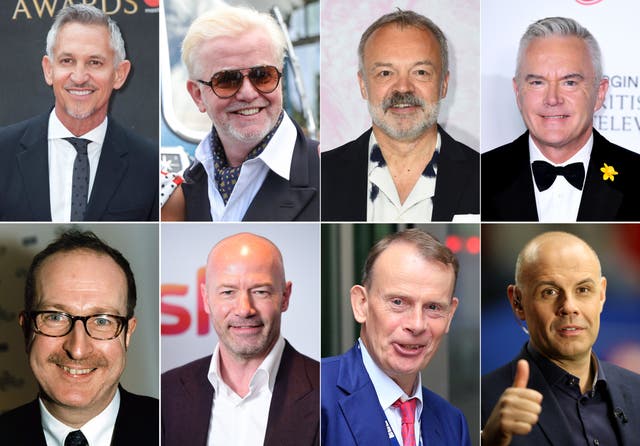
Radio 2 Breakfast Show host Ball’s £370,000 figure for her salary will rise next year as she only started her job in January.
Winkleman, on the same figure, is in the top 10 this year not because of a pay rise but because some men have fallen out out of the rankings after taking pay cuts.
Feltz is also in the top 10, with around £355,000 for work on Radio 2 and Radio London.
The total talent bill has gone up by almost £11 million to around £159 million – while 75 people at the BBC now earn more than £150,000, up from 64 last year, figures from the report show.
Radio 1 breakfast show host Greg James is up around £55,000, while football pundit Alan Shearer has seen a rise of £30,000 to around £440,000.
The salaries of stars who work on shows such as Top Gear and Doctor Who have not been published, as the broadcaster does not reveal the salaries paid through its commercial arm BBC Studios.
The top 10 puts former Radio 2 DJ Chris Evans second, with around £1.25 million – the figure he received before he quit his Breakfast Show in December.
Graham Norton completes an all-male trio at the top, receiving around £610,000 for payments for his Radio 2 show and “a range of programmes and series”, not including his chat show.
As well as Evans, DJs Simon Mayo and Eddie Mair quit the BBC recently.
